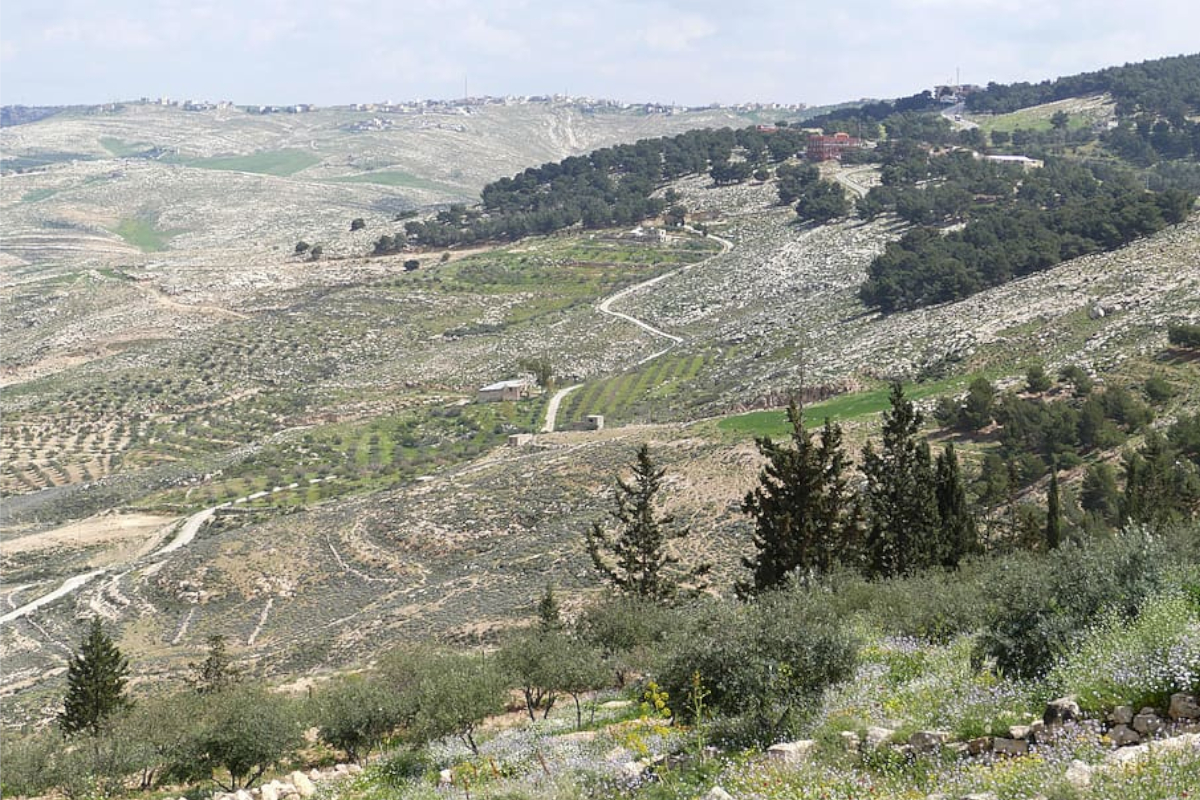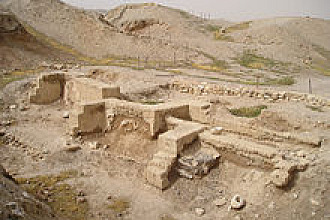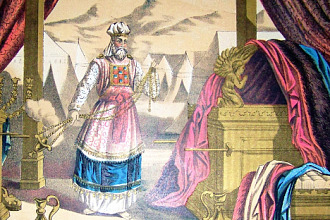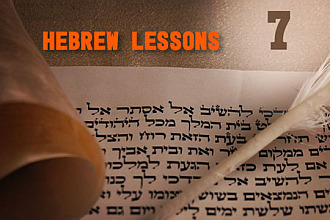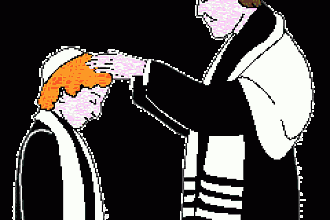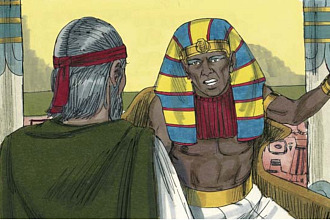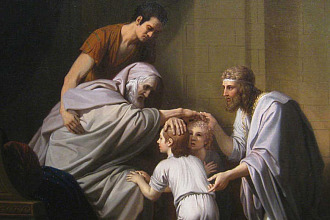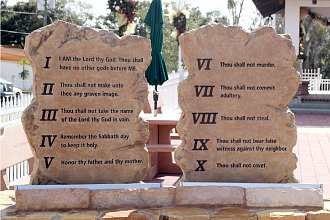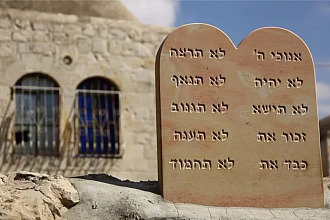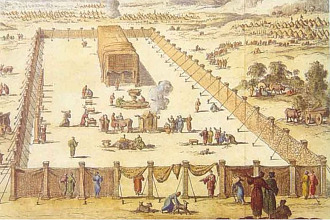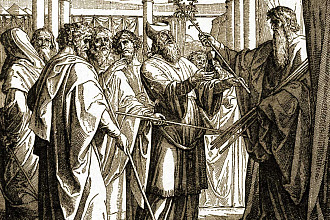Parasha for the Week: Reeh Deuteronomy 11:26 - 16:17.
Haftara for the Week: Isaiah 54:11 - 55:5.
Besorat Yeshua: Mark 6:53 - 7:8.
Overview
Moshe presents to the nation the blessing of a spiritually oriented life, and the curse of becoming disconnected from Hashem.
When the nation enters Eretz Yisrael they must burn down any trees that had been used for idol-worship, and destroy all idolatrous statues.
Hashem will choose only one place where the Divine Presence will dwell. Offerings may be brought only there; not to a private altar.
Moshe repeatedly warns against eating animal blood. In the desert, all meat was slaughtered in the Mishkan, but in Eretz Yisrael meat may be slaughtered anywhere.
Moshe lists the categories of food that may only be eaten in Jerusalem.
He warns the nation against copying ways of the other nations.
Since the Torah is complete and perfect, nothing may be added or subtracted from it.
If a "prophet" tells the people to permanently abandon a Torah law or indulge in idol worship, he is to be put to death.
One who entices others to worship idols is to be put to death. A city of idolatry must be razed.
It is prohibited to show excessive signs of mourning, such as marking the skin.
Moshe reiterates the classifications of kosher and non-kosher food.
Produce of the second tithe must be eaten in Jerusalem, and if the amount is too large to carry, it may be exchanged for money with which food is bought in Jerusalem. In certain years this tithe is given to the poor. Bnei Yisrael are instructed to always be open-hearted, and in the seventh year any loans must be discounted — Hashem will bless the person in all ways.
A Jewish bondsman is released after six years, and must be sent away with generous provisions. If he refuses to leave, his ear is pierced with an awl at the doorpost and he remains a bondsman until the Jubilee year.
The Parasha ends with the three pilgrimage festivals of Pesach, Shavuot, and Succot.
"The Chosen People"
The source of the Chosen People concept is brought this week: "You are a nation conse-crated to God your Lord. God has chosen you from all nations on the face of the earth to be His own special nation..." (Deuteronomy 14:1-2).
We are chosen for responsibility, not privilege - to act morally and to be a "light unto the nations."
"To Be Merciful"
The Torah states: "... and He will give you mercy and be merciful to you..." (Deuteronomy 13:18)
The Talmud (Yevamos 79a) cites this verse to show that being merciful is one of the basic traits of God's people. (The Almighty is an example of mercifulness.) The essence of compassion is being able to imagine yourself in someone else's situation. It is the resulting softness of the heart that makes one sensitive to the suffering of others - and allows one to strengthen his free-will to help others, though there might be a cost in personal welfare or comfort.
"Opening our Heart"
The Torah states: "If there be among you a needy person, one of your brethren within any of your gates, in your land which the Almighty, your God, gives you, you shall not harden your heart nor shut your hand against your needy brother" (Deuteronomy 15:7).
Rabbi Avraham Ibn Ezra (a 12th century Spanish commentator) explains: you shall not refrain from speaking kind words to his heart. When a person is poor, she/he suffers more than just financial deprivation - she/he suffers much emotional pain. Many times she/he might become totally discouraged and broken. Therefore, we have an obligation to open our hearts to such a person and to talk to him in a compassionate and empathetic manner. We must go out of our way to give words of encouragement. Just giving a person money without trying to help him emotionally is only part of the job. It is a sign of apathy and callousness not to try to cheer up a person who needs emotional support.
"Helping Others to feel Good"
The story is told of a blind person who had a small stand near the rabbi's home where he would sell baked goods.
Once, as the rabbi walked past the stand, he heard the blind man bemoan his difficult situation. From then on the rabbi would each day buy all his merchandise. "If you're going to buy all his baked goods anyway, wouldn't it be better to just give him the amount each week as charity?" someone asked the rabbi. "Then he wouldn't have to come out to his stand and you wouldn't have to pretend that you are buying his goods!" The rabbi replied, "the blind person feels that he is running a successful business. As a result, he feels good about himself. Is it not enough that he has lost his eye sight, do you want him to feel badly that he is taking charity, too?"
"Giving Tithes"
The Torah states regarding the second tithe: "bring all the tithes of that year's produce and store it in your towns, so that the Levites and the aliens, the fatherless and the widows who live in your towns may come and eat and be satisfied, and so that the LORD your God may bless you in all the work of your hands."
"The mitzvot are compared to a candle," it says in Proverbs. Our sages explain the comparison as follows: "Just as from one candle a person can light many candles without diminishing any of the light from the original candle, so too, through the performance of the mitzvah of giv¬ing tithes, one's wealth is not diminished."
In fact, our sages tell us that the mitzvah of giving the tithes is expressed in this Parasha with the words, "Aser TeAser" which can also be read as "Aser TeAsher" which means "give tithes and you shall be wealthy." The Torah tells us that through giving tithes one will gain wealth.
HAFTARA Isaiah 54:11 - 55:5
Tish'a Be'Av is behind us, we continue to read text of comfort called in Hebrew "Shiva D'nechemta" in Hebrew). Our consolation comes this week from Isaiah 54: 11 to Isaiah 55:5. "Come, all you who are thirsty, come to the waters; and you who have no money, come, buy and eat! Come, buy wine and milk without money and without cost" (Isaiah 55:1).
Parasha: A choice is proposed to Israel, "See, I am setting before you today a blessing and a curse" (Deuteronomy 11:26).
Haftara: A promise for everyone who makes good choices to stand for God: "No weapon forged against you will prevail, and you will refute every tongue that accuses you" (Isaiah 54:17).
Parasha: Israel is a special people, chosen by God to be his treasure, "for you are a people holy to the LORD your God. Out of all the peoples on the face of the earth, the LORD has chosen you to be his treasured possession. " (Deuteronomy 14:2) however, this promise is true also for everyone who wants to be part of God's people.
Haftara: A covenant has been made between Israel and God. A "new" covenant has been made between the people of the Mashiach and God. However, this "new" covenant is not to replace the covenant with Israel, it is the continuity of the "everlasting" covenant. "I will make an everlasting covenant with you, my faithful love promised to David" (Isaiah 55:3).
Parasha: Eating is part of the covenant. Especially in the Middle East context, eating is a sign of hospitality and fellowship, but God wants to give us only good food, he would like a pure fellowship with us. "Do not eat any detestable thing" (Deuteronomy 14:3).
Haftara: Eating with God is free, God offers to us a free salvation. "Come, all you who are thirsty, come to the waters; and you who have no money, come, buy and eat! Come, buy wine and milk without money and without cost (Is. 55:1).
Besorat Yeshua Mark 6:53 - 7:8
Parasha: In the parasha God asks Israel to make a choice (Deuteronomy 11:26)
Besora: Many Jews made the good choice and followed Yeshua. "When they had crossed over, they landed at Gennesaret and anchored there. As soon as they got out of the boat, people recognized Yeshua. They ran throughout that whole region and carried the sick on mats to wherever they heard he was. " (Mark 6:53-55) "And wherever he went — into villages, towns or countryside — they placed the sick in the marketplaces. " (Mark 6:56a) "They begged him to let them touch even the edge of his cloak, and all who touched him were healed" (Mark 6:56b).
Parasha: This parasha describes in a long text what is clean and unclean. "Do not eat any detestable thing (Deuteronomy 14:3-21).
Besora: The conflict between the pharisees and Yeshua was about clean and unclean tradition. "Why don't your disciples live according to the tradition of the elders instead of eating their food with 'unclean' hands?" (Mark 7:5) But Yeshua answered with a quotation from Isaiah. "You have let go of the commands of God and are holding on to the traditions of men" [Isaiah 29:13] (Mark 7:1).

